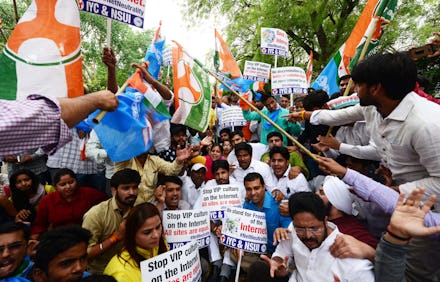India Just Rejected Facebook's Plan to Provide Free Internet to the Developing World

Facebook offered the people of India a trade: free internet in exchange for a little bit of online freedom. And India said no.
The Telecom Regulatory Authority of India — the country's version of the FCC — put out new laws on Monday that banned Facebook's Free Basics program. Free Basics is a system that gives free internet access to people in countries like India who lack it. The catch? Facebook chooses the services you can access. Those services, of course, include Facebook.
The new regulation, which says that "no service provider shall offer or charge discriminatory tariffs for data services on the basis of content," didn't explicitly use Facebook's name, but this puts a clear end to the fight between Facebook and Indian activists — at least until the laws come up for review in two years.
"It's imperialism and the East India Company all over again. Under the lie of 'digital equality.'"
Facebook has spent the past few months waging a hearts-and-minds campaign to get the people of India onboard for Free Basics. The company put up billboards in New Delhi and took out full-page advertisements in major Indian publications. Facebook CEO Mark Zuckerberg hosted the prime minister of India at Facebook's headquarters to pledge his allegiance to getting the Indian people online.
In response, the people of India took to the streets in protest.
Activists for net neutrality said that Facebook was using India's need for world-class internet connectivity as an opportunity to grow their user base. Free Basics and other "zero-rating" services let users browse without incurring data charges, letting big corporations prioritize some services over others. This puts a U.S. company like Facebook in charge of what content the people of India get priority access to.
"It's imperialism and the East India Company all over again, under the lie of 'digital equality,'" Indian venture capitalist Mahesh Murthy wrote in late December.
Finally, Zuckerberg wrote an op-ed for the Times of India, scolding activists, technologists and legislators for spreading "false claims" and saying that the cause of getting people online was worth whatever little trades the Indian people would give over to Facebook in the process.
"Who could possibly be against this?" Zuckerberg asked.
Now he knows.